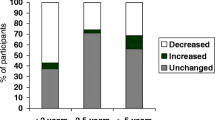Abstract
Using observations, questionnaires, and interviews, this study describes the formats used to present risk information during genetic counseling for breast and ovarian cancer. Counselees' preferences for different types of qualitative and quantitative presentation formats are also discussed. The data indicate that there is considerable variation in the presentation of risk information both within and between consultations. The counselees were positive about the way the counselors had described their risk. Seventy-three percent of the sample expressed a preference for risk to be described using quantitative formats, and there was little difference in the number who stated a preference for percentages, proportions, or population comparisons. Comparing preferred formats with those used in the consultations indicated that in over 40% of cases, risk information was not presented in the counselees' preferred quantitative format. This descriptive study raises questions about the presentation of risk information which warrant further research.
Similar content being viewed by others
REFERENCES
Bloch EV, DiSalvo M, Hall B, Epstein C (1979) Alternative ways of presenting empiric risks. In: Epstein CJ, Curry CJR, Packman S, Sherman S, Hall BD (eds) Risk Communication and Decision Making in Genetic Counseling. Birth Defects Original Articles Series, 15(5C), A.R. Liss.
Bryant GD, Norman GR (1980) Expressions of probability: Words and numbers. New Engl J Med 302:411.
Claus EB, Risch NJ, Thompson WD (1990) Age at onset a an indicator of familial risk of breast cancer. Am J Epidemiol 131:961–972.
Evans DGR, Blair V, Greenhalgh R, Hopwood P, Howell A (1994) The impact of genetic counselling on risk perception in women with a family history of breast cancer. Brit J Cancer 70:934–938.
Green JM, Murton FE (1993) Duchenne Muscular Dystrophy: The Experiences of 158 Families. Report published by the Centre for Family Research, University of Cambridge.
Hallowell N, Richards MPM (1997) Understanding life's lottery: An evaluation of studies of genetic risk awareness. J Health Psych 2:31–43.
Hallowell N, Murton F, Statham H, Green, JM, Richards MPM (1997) Women's need for information before attending genetic counselling for familial breast or ovarian cancer: A questionnaire, interview and observational study. Brit. Med J 314:281–283.
Kaback MM (1994) Perspectives in genetic screening: Principles and implications. Int J Technol Assess Health Care 10:592–603.
Kenney RM (1981) Between never and always. New Engl J Med 305:1097–1098.
Kessler S (1992) Process issues in genetic counseling. Birth Def Orig Art Ser 28:1–10.
Kessler S (1990) Current psychological issues in genetic counseling. J Psychosomat Obstet Gynecol 11:5–18.
Kessler S, Levine EK (1987) Psychological aspects of genetic counseling. IV. The subjective assessment of probability. Am J Med Genet 28:361–370.
Kong A, Barnett GO, Mosteller F, Youtz C (1986) How medical professionals evaluate expressions of probability. New Engl J Med 315:741–744.
Mapes REA (1979) Verbal and numerical estimates of probability in therapeutic contexts. Soc Sci Med 13a:277–282.
Muhr T (1994) Atlas-ti. Berlin (personally published by author).
Nakao MA, Axelrod S (1983) Numbers are better than words. Am J Med 74:1061–1065.
O'Brien BJ (1989) Words or numbers? The evaluation of probability expressions in general practice. J Royal Coll Genet Pract 39:98–100.
Pearn JH (1973) Patients' subjective interpretation of risks offered in genetic counselling. J Med Genet 10:129–134.
Pope C, Mays N (1995) Reaching the parts other methods cannot reach: an introduction to qualitative methods in health and health services research. Brit Med J 311:42–45.
Richards MPM, Hallowell N, Green JM, Murton F, Statham H (1995) Counseling families with hereditary breast and ovarian cancer: A psychosocial perspective. J Genet Counsel 4:219–233.
Robertson WO (1983) Quantifying the meanings of words. JAMA 249:2631–2632.
Shaw NJ, Dear PRF (1990) How do parents of babies interpret qualitative expressions of probability. Arch Dis Child 65:520–523.
Shiloh S (1996) Decision-making in the context of risk. In: Marteau TM, Richards MPM (eds) The Troubled Helix: The Benefits and Hazards of the New Human Genetics. Cambridge University Press.
Slovic P (1986) Informing and educating the public about risk. Risk Anal 6:403–415.
Somer M, Mustonen H, Norio R (1988) Evaluation of genetic counseling: Recall of information, post-counseling reproduction, and the attitude of the counselees. Clin Genet 34:352–365.
Statham H, Green JM, Hallowell N, Murton F, Richards MPM (1996) Genetic Counselling for Breast and Ovarian Cancer: Why Do Women Attend? Poster presented at the 5th European Meeting on Psychosocial Aspects of Genetics, Rome, September 26–28, 1996.
Toogood JH (1980) What do we mean by “usually?” Lancet 1:1094.
Author information
Authors and Affiliations
Rights and permissions
About this article
Cite this article
Hallowell, N., Statham, H., Murton, F. et al. “Talking About Chance”: The Presentation of Risk Information During Genetic Counseling for Breast and Ovarian Cancer. Journal of Genetic Counseling 6, 269–286 (1997). https://doi.org/10.1023/A:1025624221369
Issue Date:
DOI: https://doi.org/10.1023/A:1025624221369



